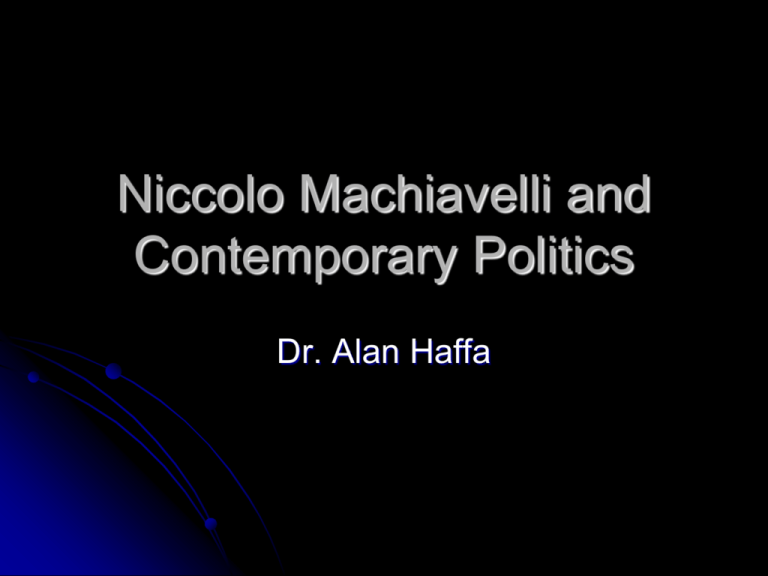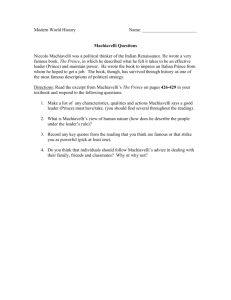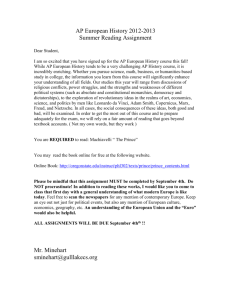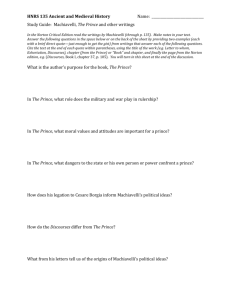Niccolo Machiavelli 2015
advertisement

Niccolo Machiavelli and Contemporary Politics Dr. Alan Haffa Niccoló Machiavelli (1469-1527), Involved in the expulsion of the Medici in the 1490s and served as Secretary for the Republic that lasted from 1494-1512 Accused of conspiracy and exiled in 1513 Writings: The Prince (1513, pub.1532); Discourses on Livy (pub. 1531); History of Florence, 1520; Art of War, 1521; Play entitled The Mandrake (1528) Writings put on the Index of Prohibited Books, 1564 Florence in the late 15th and early 16th centuries 1494; Piero de’ Medici made a treaty with Charles VIII of France, which outraged the people Piero is overthrown by popular revolt and the people make their own treaty with France; Dominican Friar, Savanarola, excommunicated and burned in 1498 Loss of fortresses, including Pisa; regaining Pisa was Florence’s goal for years Republic was overthrown by Spanish in 1512 when M.’s militia was defeated at Prato; Medici reinstated by Spain Method Political Science and Social Science Looks at classical anecdotes to draw lessons Observes similar lessons from looking at contemporary politics Establishes political “laws” The Discourses: Public Indictments “Public Indictments are for the maintenance of Liberty in a Republic” Coriolanus: Called for the plebs to be denied corn dole; murdered had not tribunes called him to testify Legal outlet for anger of the people Valori: power of a prince; no constitutional opposition; “Had it in this case been possible to oppose Valori by constitutional methods, an end would have been had to his authority without harm to anybody but himself…” False Rumors (Calumnies) are Bad for Republics “Calumnies are more prevalent in cities in which less use is made of public accusations, and in which less provision has been made for receiving them. He, therefore, who constitutes a republic should do it in such a way that charges may be brought against any citizen without fear of any kind and without respect to persons. Where provision for this has been made, and due recourse is had to it, calumniators should be severely punished.” Whistleblowers? The Prince: Ways to Consolidate a Conquest Settlements versus Military Garrisons Best of all is for the Prince to go and Live there Establishment of settlements: only angers those who are displaced, and they are weak and scatted; the new colonists have a commitment to fight for you Modern Parallels? Israeli settlements in West Bank and Gaza Garrisons: Need for Many Troops Easy to get revenge on you as troops are a visible target of your presence Garrisons costs more money and do more injury to the conquered people because of how an army impacts the area Modern Parallel? Iraq? How to hold and pacify conquered territory Become a friend of weak neighboring states Weaken stronger neighbors however possible; Danger of strong neighbors: a faction will invite them to invade and their strength makes them dangerous Modern Parallel in Iraq? American policy toward Iran and Syria on the one hand; Saudi Arabia and Kuwait on the other; Iran? Ancient Example: The Aetolians brought Rome into Greece Louis XII of France was invited into Italy by the Venetians Countries used to a Prince are easier to Control Precept: it is easier to conquer a country with many factions and divisions; but, it is harder to control it once taken. It is harder to conquer a unified country, long used to it’s “prince” and used to being ruled; but, it is easier to control it once taken Japan in WWII versus Iraq? Precept on War Never allow disorder to continue so as to escape a war “One does not escape; the war is merely postponed to one’s disadvantage” He might well have supported a preemptive war against Iraq Cold War Example: He would have advised war with Russia at the end of WW II; would that have been wise in hindsight? Ways to Acquire Power Ability and Prowess: Moses Fortune: Cesare Borgia (son of Pope Alexander VI) Crime: Syracusan Agathocles whose soldiers killed the Senate Crime can bring Power, but not Glory Counter Example: Oliverto di Fermo, who killed his maternal Uncle to gain the city Modern Parallel: Sadaam Hussein; Mussolini? Violence and Cruelty? Cruelty will make you hated and that could stir up popular resentment and uprising Yet, cruelty in of itself should not be avoided; but it should be used well—it should be final, it should be for safety, and it should not be persisted in. “Violence must be inflicted once for all” Summary: Do your dirty work and get it over with; don’t drag it out or gradually increase it Modern Parallel: Our military policy in Vietnam versus Iraq; Shock and Awe versus ‘graduated response’ Factions People, Nobles, and Army The King needs the People, but nobles he can make or unmake at will; Caesar Augustus as example If you have qualities the people admire—courage, perseverance, cautious wisdom—the people will support you Besides the people, you must keep control of the Army; most coups are led by generals Modern Parallel: President as Commander in Chief, not generals Army “You cannot have god laws without good arms, and when there are good arms,good laws inevitably follow.” True or False? Army should be a citizen army; M. blames the decline of Italy partly on the use of auxillaries (allies) and mercenaries; the strength of one is a threat and the cowardice of the other Why did we not make use of Turkey as an ‘auxillary’ in the Iraq war? Kurdish militia? Ancient Parallel: Decline of Rome began when she hired Goths as mercenaries Future of our volunteer army; if we ever hire foreigners to serve in the army, look out! Political Pragmatism: RealPolitik “The fact is that a man who wants to act virtuously in every way necessarily comes to grief among so many who are not virtuous.” True or False? ‘A prince must avoid the reputation for vice, but when necessary, he must know how to act contrary to virtue.’ The end justifies the means Modern Question: Is Torture a Proper Policy in the war on terrorism? Compassion? “Better to be reputed compassionate than cruel, but do so in the right way.” “It is better to be feared than loved, if you cannot have both.” Avoid being Hated! Do not take the property or women of your citizens! Modern Issue: Imminent Domain? Detainee Treatment? Fox and Lion Be a Fox (Deceptive) AND a Lion (Brave and courageous) “A ruler must NOT honor his word when it is not to his advantage to do so or when the reasons for which he made a promise no longer exist” “If all men were good this precept would be immoral; but they are not. Because men are wicked and would not keep their word to you, you don’t have to keep yours.” Morality is based upon reciprocity, not an internal or divine code Appearances Count more than Reality “He should appear compassionate, faithful to his word, kind, guileless and devout…but if need be, he should be ready to do the opposite.” Appear to keep your word? “No New Taxes!” sunk Bush Sr. “I did not have relations with that woman.” sunk Clinton Religion “Nothing so important as to appear religious.” Image is everything “Everyone sees what you appear to be, but few experience what you really are” Modern Parallel: Do we observe this in contemporary politics? Avoid being Hated “Princes should delegate to others the enactment of unpopular measures and keep in their own hands the distribution of favors.” College governance: Deans versus Presidents Clinton: assigned Healthcare reform to Hillary Bush: Use of Swift Boat Veterans to attack the patriotism of Kerry Response to Iraq Criticism and Rep. Murtha; why not as successful? Conclusions Machiavelli was hated in his day for revealing the truth about how politics was conducted His precepts are still valid today: 1) image is everything; 2) importance of appearing religious and moral; 3) Appear to keep your word—a politician popularity is finished if he appears to have lied; M. really wanted a strong prince to unify Italy, drive out the foreigners, and restore Italy’s pride and honor Is Machiavelli relevant in a modern Republic?







